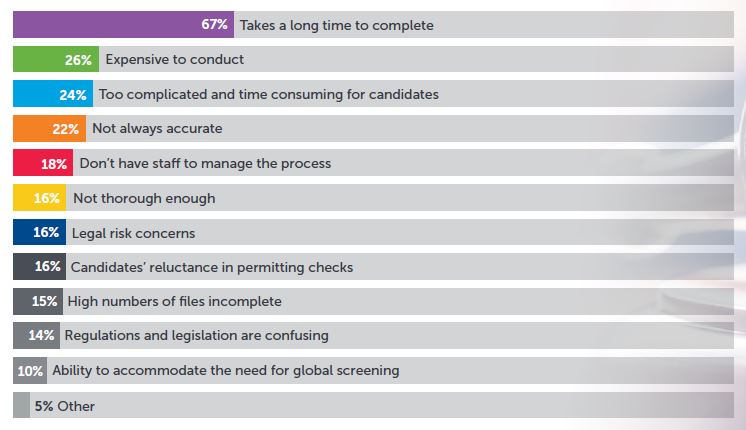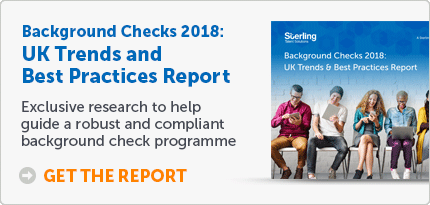July 2nd, 2018 | Sterling
Tips for Overcoming the Top 5 Background Check Challenges
With GDPR updates going into effect on 25 May 2018 and the transition to Brexit starting next year, there is and will be many changes in the hiring compliance landscape in the next year. The need for employers to hire with confidence is growing even more crucial, which is why background checks plays a vital role in successful recruitment practices. Background screening matters because it protects an organisation’s property, assets, reputation, brand and ultimately its biggest asset, the people.
Sterling surveyed over 300 UK-based employers in 33 industries about their use of background checks to gain key insights into emerging trends, technology and more for our Background Checks 2018: UK Trends & Best Practices Report. We surveyed businesses large (over 10,000 employees) and small (up to 49 employees) with the largest group of respondents representing companies with 100-299 employees.
Why Are Employers Conducting Background Checks?
The number-one reason respondents gave for screening candidates was improving or meeting regulatory compliance. This is to be expected as highly regulated sectors, such as financial services, legal services and security, have specific screening requirements, while there are other hiring processes, such as Right to Work checks, which are obligatory for all employers. Interestingly, safety and security in the workplace has climbed two places since our last report in 2016, suggesting that employers recognise their duty to ensure employees feel safe at work, amid rising concerns over security and workplace violence.
Background Check Challenges
Background screening is complicated. There is no way around that. Sterling asked the survey respondents what the biggest background screening challenges they have faced in the past year. The results were varied, but overall, the biggest background check challenges facing companies comes down to time, cost, accuracy and staffing:

Overcoming the Challenges
While a robust screening process can take time, outsourcing part or all of it could speed up time-to-hire, enabling the HR department to focus on the core functions of the department and reduce the burden on resources. The cost will no doubt be a factor regardless of whether screening is done in-house, via a third party or a combination of the two. However, a clear return on investment is likely on any robust background check programme. A recent report estimated that a bad hire at the mid-manager level, with a salary of £42,000, could cost a business more than £132,000. Consider also how much more it would cost if someone was recruited who subsequently committed fraud in the business and had perhaps concealed a criminal conviction? Fraud can impact the bottom line in a number of ways, such as damage to reputation and brand, litigation costs and staff replacement costs.
Benefits of Outsourcing Background Checks
Over half of businesses surveyed plan to outsource background screening to a third-party provider in the next year, indicating that the benefits of doing so sufficiently outweigh any uncertainties. Outsourcing can be more cost efficient, save valuable time and provide greater accuracy and compliance. Businesses are more likely to use in-house resources to screen for Right to Work, reference interviews and education credentials, while they are inclined to use a paid third-party for criminal records, credit/financial history and public safety verification.
There are many benefits of working with a third-party screening provider including enhanced efficiency, automated processes, objective reporting and working with a team who has the experience of working with a variety of clients and organsational sizes. They will also be able to help guide companies through the ever-changing compliance landscape and provide ways to create a positive and seamless candidate experience. The benefits of outsourcing will continue to overcome most reservations and help to correct the background screening challenges that companies face. The number of employers conducting background checks has risen this year, indicating that more organisations recognise the importance of a robust screening programme. With increased globalisation and an ever-more-complex legal landscape, it is anticipated that screening will continue to grow.
Find out more survey results and information on background screening trends by downloading a copy of “Background Checks 2018: UK Trends & Best Practices Report”.
This publication is for informational purposes only and nothing contained in it should be construed as legal advice. We expressly disclaim any warranty or responsibility for damages arising out this information. We encourage you to consult with legal counsel regarding your specific needs. We do not undertake any duty to update previously posted materials.

